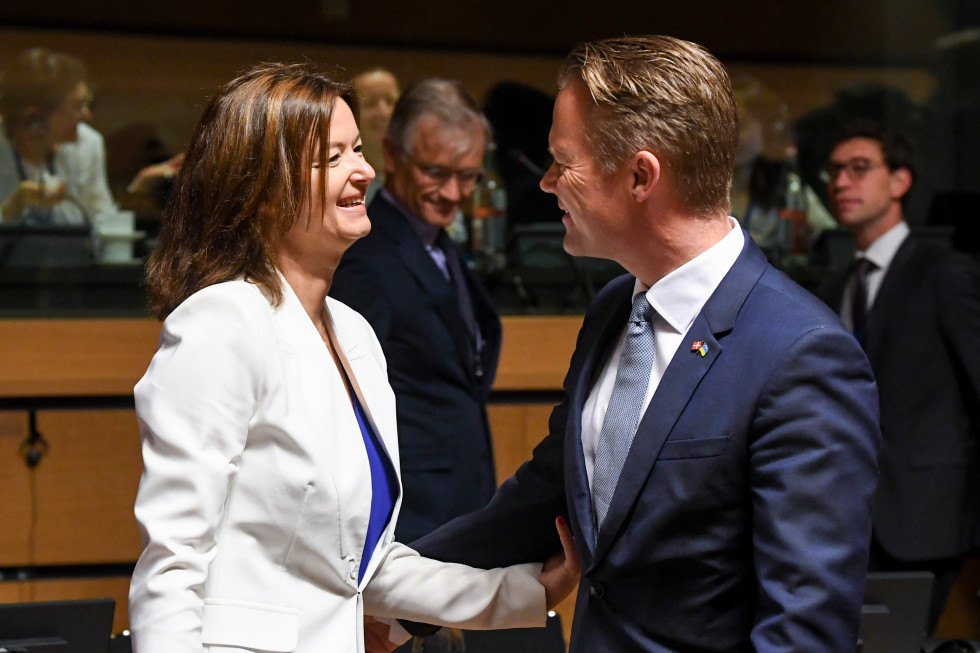Foreign Affairs Council on Russian aggression against Ukraine and Slovenia’s proposal to grant EU candidate status to Bosnia and Herzegovina
- Ministry of Foreign Affairs

Minister Tanja Fajon and Minister of Foreign Affairs of Denmark Jeppe Kofod | Author European Union
At the EU Foreign Affairs Council, ministers continued their discussion on the implications for global food security of the Russian aggression against Ukraine. They took note of the EU Action Plan on the geopolitical consequences of the Russian aggression against Ukraine on third countries, and adopted Council Conclusions on food security.
Minister Fajon stressed that Slovenia strongly condemns the Russian aggression. She gave assurances of continued support and assistance to Ukraine and its people, called for those responsible for violations of international law to be punished, and supported the European perspective of the three Eastern Partnership countries. “Slovenia supports the granting of EU candidate status to Ukraine and Moldova, as well as the confirmation of the European perspective for Georgia. However, we must not leave aside the Western Balkan countries. Peace and stability in the region are important to us, and the credibility of the enlargement process will only be preserved if the EU accelerates the granting of EU candidate status to Bosnia and Herzegovina, opens accession negotiations with North Macedonia and Albania, and facilitates visa liberalisation or visa waiver for Kosovo citizens. Both Ukraine and the Eastern Partnership countries, as well as the countries of the Western Balkans, can count on Slovenia's friendly support and determined efforts on their European path,” said Ms Fajon on the margins of the EU Foreign Affairs Council.
Food security was also in the focus of the central part of the ministers’ discussion on Egypt, one of the countries in the region most strongly affected by the consequences of the war in Ukraine. High Representative Josep Borrell stressed that the new EU-Egypt Partnership Priorities adopted at yesterday's Association Council provide a basis for further strengthening of bilateral relations and a framework for joint activities in various fields. It is in the EU's interest to build a close and reliable partnership with Egypt. Over a working lunch, ministers held an informal exchange of views with Egypt's Foreign Minister Sameh Shoukri, in particular on the preparations for the COP27 climate conference in November and on the Russian invasion of Ukraine, which poses a threat to the food security of millions of people around the world.
In her talks with Egyptian Foreign Minister Shoukri, Minister Fajon highlighted Egypt's role as an important partner and pillar of stability in the region, with which the EU must maintain regular dialogue and cooperation in key areas of strategic interest. She went on to reiterate the importance of EU support to Egypt in the organisation of COP27 and assured her counterpart of Slovenia’s continued commitment to the process.
The discussion on the Horn of Africa covered positive developments in the region and stimulation of progress, especially in view of the opportunity for the EU to contribute to the further stabilisation of the situation in Ethiopia, Somalia and Sudan. The focus was on the situation in Ethiopia, where there has been visible progress, but where further efforts to end the conflict, negotiate peace, address accountability for human rights violations and further improve humanitarian access need to be expended. Minister Fajon assured Slovenia's support for the EU's united and concerted endeavours to encourage positive developments in the countries of the region.
On the margins of the meeting, Minister Fajon met for the first time with her French counterpart Catherine Colonna. She congratulated Minister Colonna on the successful French Presidency of the Council of the EU, which concludes at the end of the month, and discussed with her the EU perspective for the Western Balkans.

